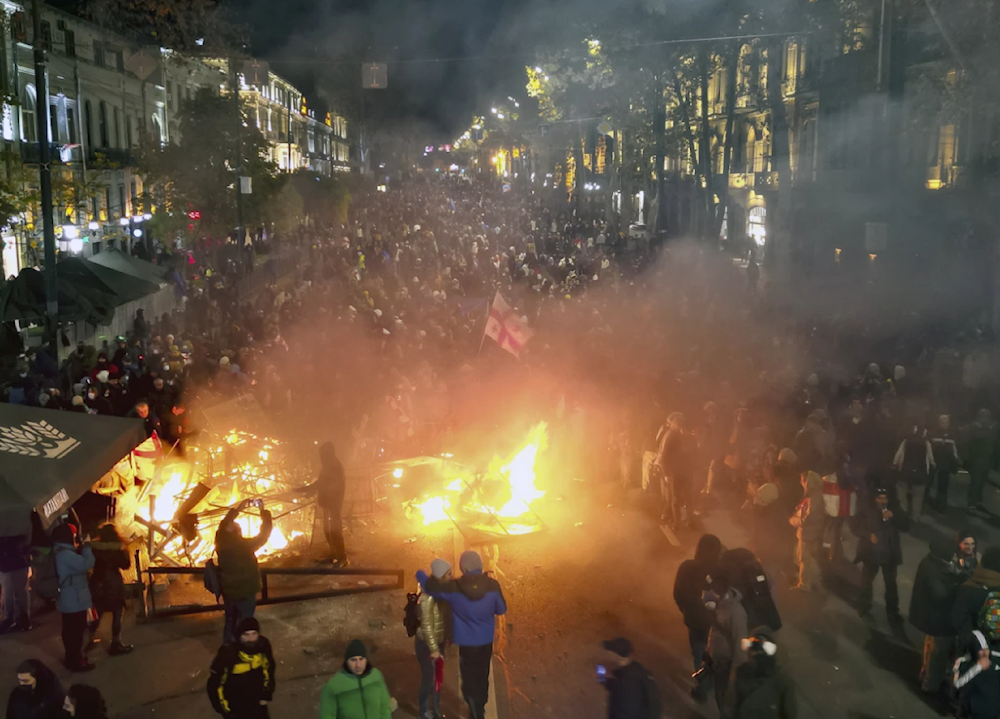Georgian PM blames 'EU politicians and agents' for unrest
Prime Minister Irakli Kobakhidze has vowed there will be no "Maidan", referring to the 2014 color revolution in Ukraine.
-

Protesters pour into the streets and light fires following Georgian Prime Minister Irakli Kobakhidze's announcement, rallying outside parliament in Tbilisi, Georgia on November 29, 2024. (AP)
Georgian Prime Minister Irakli Kobakhidze has promised that the country will not allow a situation like Ukraine's Maidan to unfold.
He alluded to the color revolution in Kiev a decade ago, which deposed Ukraine's democratically elected president, sparked hostilities across the nation, and resulted in the current war between the country and Russia.
“Unlike Ukraine in 2013, Georgia is an independent state with strong institutions and, most importantly, experienced and wise people. The Maidan scenario cannot be realized in Georgia. Georgia is a sovereign state and will not allow this,” Kobakhidze said during a conference on Saturday, as reported by News Georgia.
He explained how the present violent upheaval in Georgia, like the Maidan coup, is the product of EU politicians and their operatives interfering with the country's affairs.
"The main responsibility for yesterday's violent rally lies with the relevant European politicians and bureaucrats, with local agents, the fifth column, which is represented by four opposition parties," said the minister.
Protests continue over Georgian Dream Party's election win
On Friday, police dispersed an anti-government gathering in downtown Tbilisi with tear gas and water cannons.
Kobakhidze condemned the demonstration as an "attack on the constitutional order in the country," and thanked police for keeping protesters from storming the parliament, saying they defended Georgia's sovereignty and independence.
Protests began in Georgia late last month, when the ruling Georgian Dream Party won the parliamentary election. The party is recognized for advocating pragmatic ties with all neighbors, especially Russia, and has lately approved regulations that have sparked controversy in the West, such as a foreign agents law.
Georgian President Salome Zourabichvili, who has long been at odds with the elected administration, not only disputed the election results but also urged people to demonstrate in the streets. Zourabichvili must summon the new parliament within ten days of the final CEC protocol's release.
The EU, which gave Georgia candidate status in 2023, supported the opposition, with the European Parliament denouncing the elections as "neither free nor fair" and demanding renewed elections.
US plans to support Georgian opposition protests during elections: SVR
Back in September, the Russian Foreign Intelligence Service (SVR) revealed it had obtained evidence that the US Department of State was planning to assist the Georgian opposition in seizing power by providing a pretext for protests around the time of the October 26 legislative elections.
"Washington's plan is clear and no longer surprising — it is to give the pro-Western Georgian opposition a reason to stage mass protests to seize power in the country by force," the agency said in a statement.
The SVR said that the US had the support of the OSCE Office for Democratic Institutions and Human Rights (ODIHR), which is expected to release an interim report on Georgia's electoral process weeks before the election.
This report is predicted to accuse the Georgian Dream-led government of failing to ensure a free and fair election.
In May, the Georgian parliament passed a measure on foreign agents, which aims to limit the power of institutions, such as Western NGOs, receiving foreign funds.
The bill calls for compiling a list of people and organizations that receive funding from overseas, which sparked widespread protests and concerns among the opposition, who are concerned that it will allow the government to suppress the work of NGOs and activists in the country.

 4 Min Read
4 Min Read








